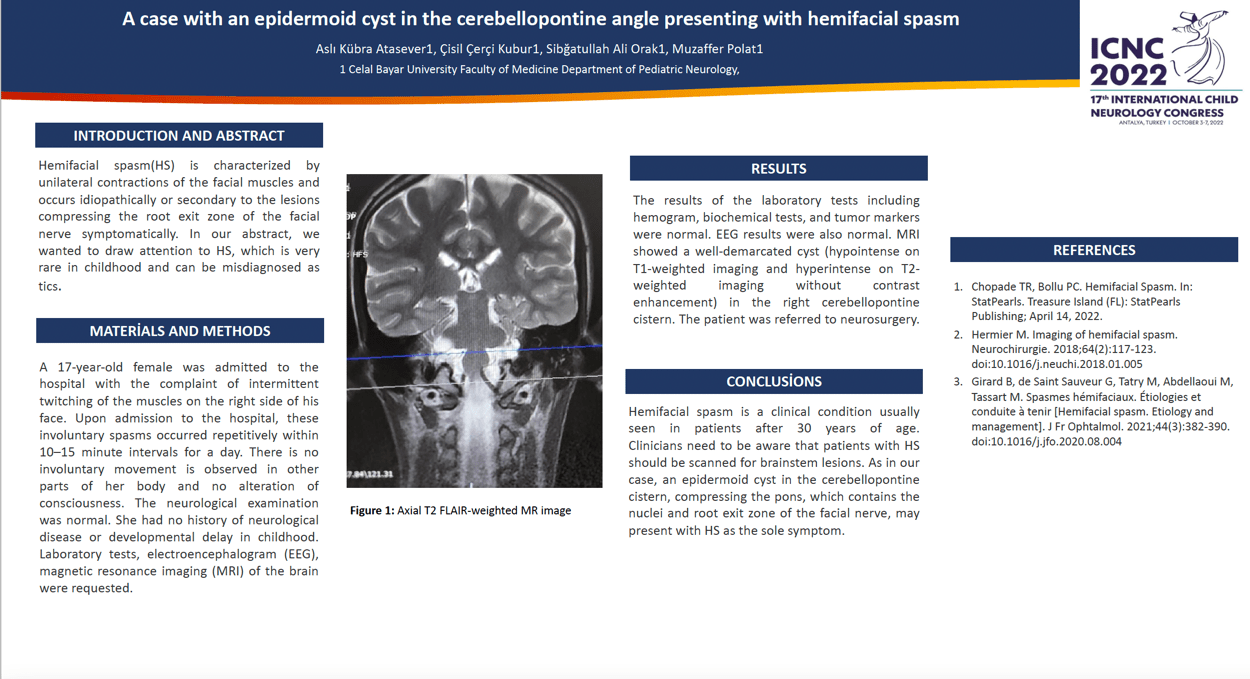A case with an epidermoid cyst in the cerebellopontine angle presenting with hemifacial spasm
ASLI KÜBRA ATASEVER, ÇİSİL ÇERÇİ KUBUR, Sibğatullah Ali ORAK, Muzaffer POLAT
Objectives: Hemifacial spasm(HS) is characterized by unilateral contractions of the facial muscles and occurs idiopathically or secondary to the lesions compressing the root exit zone of the facial nerve symptomatically. In our abstract, we wanted to draw attention to HS, which is very rare in childhood and can be misdiagnosed as tics.
Methods: A 17-year-old female was admitted to the hospital with the complaint of intermittent twitching of the muscles on the right side of his face. Upon admission to the hospital, these involuntary spasms occurred repetitively within 10–15 minute intervals for a day. There is no involuntary movement is observed in other parts of her body and no alteration of consciousness. The neurological examination was normal. She had no history of neurological disease or developmental delay in childhood. Laboratory tests, electroencephalogram (EEG), magnetic resonance imaging (MRI) of the brain were requested. Results: The results of the laboratory tests including hemogram, biochemical tests, and tumor markers were normal. EEG results were also normal. MRI showed a well-demarcated cyst (hypointense on T1-weighted imaging and hyperintense on T2-weighted imaging without contrast enhancement) in the right cerebellopontine cistern. The patient was referred to neurosurgery. Conclusion: Clinicians need to be aware that patients with HS should be scanned for brainstem lesions. As in our case, an epidermoid cyst in the cerebellopontine cistern, compressing the pons, which contains the nuclei and root exit zone of the facial nerve, may present with HS as the sole symptom.
Keywords: hemifacial spasm, epidermoid cyst, tic
ASLI KÜBRA ATASEVER
ICNC 2022
Turkey
ÇİSİL ÇERÇİ KUBUR
ICNC 2022
Turkey
Sibğatullah Ali ORAK
ICNC 2022
Turkey
Muzaffer POLAT
ICNC 2022
Turkey
Objectives: Hemifacial spasm(HS) is characterized by unilateral contractions of the facial muscles and occurs idiopathically or secondary to the lesions compressing the root exit zone of the facial nerve symptomatically. In our abstract, we wanted to draw attention to HS, which is very rare in childhood and can be misdiagnosed as tics.
Methods: A 17-year-old female was admitted to the hospital with the complaint of intermittent twitching of the muscles on the right side of his face. Upon admission to the hospital, these involuntary spasms occurred repetitively within 10–15 minute intervals for a day. There is no involuntary movement is observed in other parts of her body and no alteration of consciousness. The neurological examination was normal. She had no history of neurological disease or developmental delay in childhood. Laboratory tests, electroencephalogram (EEG), magnetic resonance imaging (MRI) of the brain were requested. Results: The results of the laboratory tests including hemogram, biochemical tests, and tumor markers were normal. EEG results were also normal. MRI showed a well-demarcated cyst (hypointense on T1-weighted imaging and hyperintense on T2-weighted imaging without contrast enhancement) in the right cerebellopontine cistern. The patient was referred to neurosurgery. Conclusion: Clinicians need to be aware that patients with HS should be scanned for brainstem lesions. As in our case, an epidermoid cyst in the cerebellopontine cistern, compressing the pons, which contains the nuclei and root exit zone of the facial nerve, may present with HS as the sole symptom.
Keywords: hemifacial spasm, epidermoid cyst, tic
ASLI KÜBRA ATASEVER
ICNC 2022
Turkey
ÇİSİL ÇERÇİ KUBUR
ICNC 2022
Turkey
Sibğatullah Ali ORAK
ICNC 2022
Turkey
Muzaffer POLAT
ICNC 2022
Turkey

ASLI KÜBRA ATASEVER
ICNC 2022 Turkey
ICNC 2022 Turkey